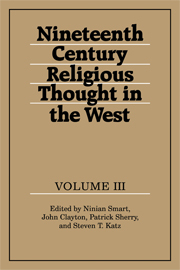Book contents
- Frontmatter
- Contents
- Preface
- 1 RELIGION AND SCIENCE
- 2 FRIEDRICH NIETZSCHE
- 3 JEWISH THOUGHT
- 4 THE STUDY OF THE OLD TESTAMENT
- 5 THE STUDY OF THE NEW TESTAMENT
- 6 FRIEDRICH MAX MÜLLER AND THE COMPARATIVE STUDY OF RELIGION
- 7 THE ANTHROPOLOGY OF RELIGION: BRITISH AND FRENCH SCHOOLS
- 8 MAX WEBER AND GERMAN SOCIOLOGY OF RELIGION
- 9 ERNST TROELTSCH
- INDEX
2 - FRIEDRICH NIETZSCHE
Published online by Cambridge University Press: 26 January 2010
- Frontmatter
- Contents
- Preface
- 1 RELIGION AND SCIENCE
- 2 FRIEDRICH NIETZSCHE
- 3 JEWISH THOUGHT
- 4 THE STUDY OF THE OLD TESTAMENT
- 5 THE STUDY OF THE NEW TESTAMENT
- 6 FRIEDRICH MAX MÜLLER AND THE COMPARATIVE STUDY OF RELIGION
- 7 THE ANTHROPOLOGY OF RELIGION: BRITISH AND FRENCH SCHOOLS
- 8 MAX WEBER AND GERMAN SOCIOLOGY OF RELIGION
- 9 ERNST TROELTSCH
- INDEX
Summary
On interpreting Nietzsche
Nietzsche's thought does not submit easily to conventional forms of exposition or appraisal. His was not an ‘academic’ philosophy, and he was adamant that it should not be treated as such. In form it is idiosyncratic and bewildering; in content it is radical, ruthless and very often offensive. So was it intended. Scholars and academic philosophers have been perplexed by this ‘untimely thinker’. Some have dismissed his thought altogether as philosophically uninteresting; others have attempted to domesticate it, to bring it into the mainstream of western philosophical thought. Both approaches are misguided and are wholly unable to give a convincing account of Friedrich Nietzsche (1844–1900) or his significance as a philosophical and a religious thinker. To do him justice, we must treat him as both. For it is clear that the impetus for his philosophical quest lay in his violent opposition to Christianity and in his almost frantic attempt to replace it with a viable substitute. He remains, in this sense, a religious thinker even in his opposition to religion.
One ought not speak of Nietzsche as philosopher without some qualification. He was a philologist, not a philosopher, by training. He lacked detailed or even accurate knowledge of any of the intellectual movements of his day – including those which he took up or with which he took issue in his writings. His insights into those movements, especially those insights which penetrate most deeply to the heart of the matter, are almost wholly intuitive and untutored.
- Type
- Chapter
- Information
- Nineteenth-Century Religious Thought in the West , pp. 37 - 70Publisher: Cambridge University PressPrint publication year: 1985
- 1
- Cited by



